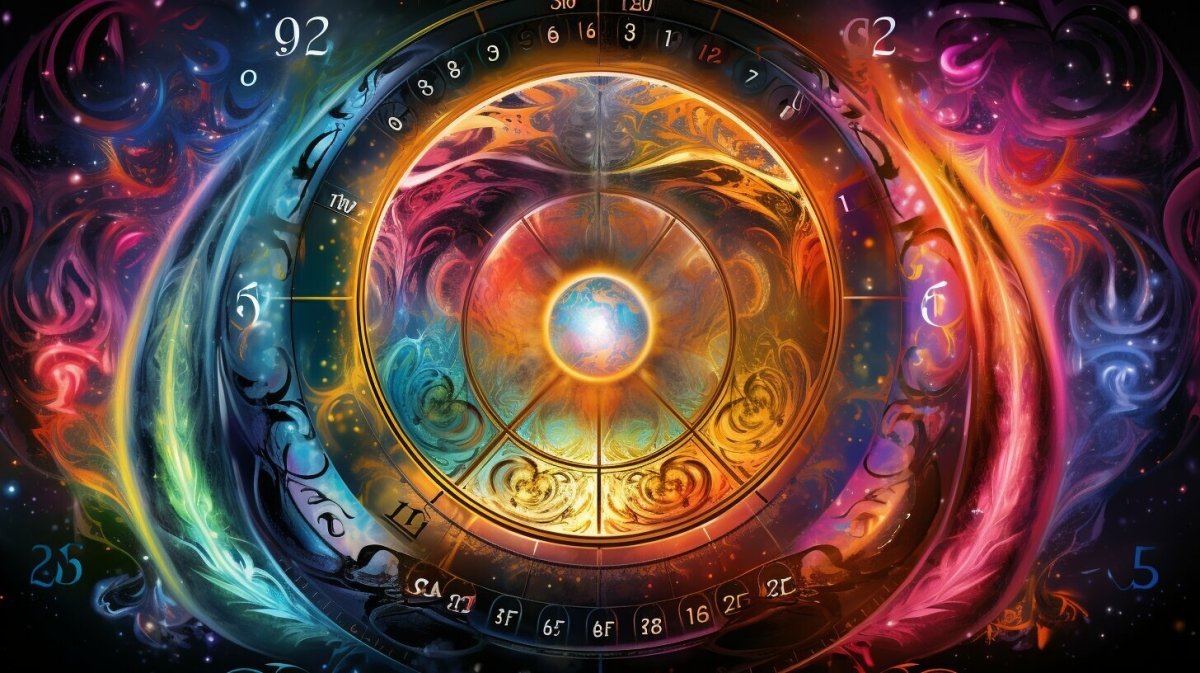
Numerology is an ancient practice that has fascinated people for thousands of years. But, when did numerology begin? This is a question that has puzzled scholars and enthusiasts alike for centuries.
While the exact origins of numerology remain unclear, it is believed to date back to the ancient civilizations of Egypt, Mesopotamia, and Greece. The practice is rooted in the belief that numbers hold mystical and symbolic properties that can unlock hidden meanings and reveal insights into the natural world.
The Ancient Roots of Numerology
Numerology has a rich and ancient history. The origins of numerology can be traced back to ancient civilizations, where numbers were not merely regarded as mathematical symbols, but as divine entities with mystical properties. The practice of numerology was believed to carry the power to decode the secrets of the universe, predict the future, and even reveal a person's destiny.
The Earliest Known Instances of Numerology
The earliest known instances of numerology can be found in ancient Egypt and Babylon. The Egyptians are known to have used numerology in their architecture, art, and religion. They believed that numbers held spiritual meaning and that their energies could be harnessed to influence the physical world.
The Babylonians, on the other hand, developed a complex system of numerology that was based on the idea that every number had a corresponding deity. They used numerology for divination and to predict the future.
The Connection between Numerology and Ancient Civilizations
Numerology was not limited to Egypt and Babylon. It played a significant role in the ancient cultures of Greece, Rome, China, and India. The Greeks, for instance, believed that numbers were the building blocks of the universe and that they held the key to understanding the cosmos.
The Chinese also developed their own system of numerology, which they used to determine auspicious dates for weddings, business ventures, and other important events. In India, numerology was closely linked to astrology and was used to determine a person's fate and character traits.
Overall, numerology played a fundamental part in the beliefs and practices of many ancient civilizations. Its influence can still be seen today in the different numerology systems that have emerged throughout history.
Numerology in Ancient Cultures
Throughout history, numerology has been practiced and interpreted in various ways by different cultures. In this section, we will explore how numerology was perceived and employed by some of the most prominent ancient civilizations, including Mesopotamia, Egypt, Greece, and China.
Numerology in Mesopotamia
One of the earliest evidences of numerology can be found in ancient Mesopotamia, which is present-day Iraq. Mesopotamian scribes used various numerical systems to keep records of everything from livestock to commercial transactions, and believed that numbers had mystical properties that could influence human affairs. This belief was reflected in their use of numerology to interpret omens and determine destiny.
The Babylonians, who inhabited Mesopotamia between the 18th and 6th centuries BCE, developed an elaborate system of numerology called gematria, which assigned numerical values to each letter of the alphabet. They used gematria to analyze the names of individuals and events, and to predict the future.
Numerology in Egypt
In ancient Egypt, numerology was closely tied to their religious beliefs and practices. Egyptians believed that the universe was created based on mathematical principles, and that numbers held divine power.
The Egyptians assigned numerical values to their gods and used numerology to decipher the hidden meanings of their hieroglyphics. For instance, the number nine was associated with the god Atum, who represented completeness and perfection, while the number 42 was associated with the judgment of the deceased.
Numerology in Greece
The ancient Greeks also had a deep fascination with numerology, which they believed was a key to understanding the universe and the human condition. Pythagoras, a Greek philosopher and mathematician, is credited with developing the most influential system of numerology in the Western world, known as the Pythagorean system.
According to Pythagoras, everything in the universe could be reduced to numbers and that each number had a unique vibrational frequency that affected the nature of individual or event. This idea was extended to include the concept of the "soul number," which was assigned to individuals based on their birthdate and was thought to indicate their fate and character.
Numerology in China
Chinese numerology, also known as feng shui, has its roots in ancient Chinese philosophy, which held that everything in the universe was interconnected and influenced by invisible forces. According to feng shui practitioners, each number had a unique energy and significance, and could be used to promote balance and harmony in an individual's life.
For instance, the number 8 was considered lucky in Chinese numerology as it was associated with prosperity and wealth, while the number 4 was considered unlucky because it sounded similar to the word for death in Chinese.
The practice of numerology continues to evolve and adapt to new cultures and beliefs, but its core principles of assigning meaning and significance to numbers remains a constant.
The Influence of Pythagoras
Pythagoras of Samos is widely considered to be the father of modern numerology. He was an ancient Greek philosopher and mathematician who made significant contributions to the field of mathematics and the study of numbers. Pythagoras believed that everything in the universe could be explained through numbers and that they held specific meanings and vibrations.
Pythagoras developed a system of numerology that is known as the Pythagorean system, which is still widely used today. This system assigns numerical values to each letter of the alphabet, allowing words and phrases to be reduced to a single digit number. These numbers are then interpreted to reveal insights into a person's personality, strengths, weaknesses, and destiny.
The Influence of Pythagoras
Pythagoras' teachings on numerology were not limited to just numbers and their meanings. He believed that numbers held spiritual significance and could be used for divination and prophecy as well. According to Pythagoras, numbers were the key to unlocking the mysteries of the universe and understanding the divine.
Pythagoras' teachings on numerology were embraced by his followers and spread throughout Europe and the Middle East, where they were integrated into various religious and philosophical beliefs. The Pythagorean system of numerology remained popular in the West and is still widely used today.
Overall, Pythagoras' contributions to the field of numerology were immense, and his work has left a lasting impact on the study of numbers and their meanings. Through his teachings and system of numerology, Pythagoras helped people gain a deeper understanding of themselves and the world around them.
Numerology in the Middle Ages
During the Middle Ages, numerology continued to evolve and became integrated into various religious and philosophical beliefs. The Christian church, for example, incorporated numerology into its theology and used it to interpret religious texts.
One of the most influential figures in medieval numerology was the philosopher and theologian Saint Augustine. In his book "De musica," Augustine explored the relationship between numbers and music, arguing that the principles of musical harmony could be applied to the ordering of the universe.
The Jewish mystical tradition of Kabbalah also embraced numerology during this time, developing its own system that assigned meanings to the numbers 1-10 and their combinations. Kabbalistic numerology was believed to reveal hidden truths about the divine and the universe.
Numerology in Christian Theology
Christian numerology was particularly concerned with the number three, which was seen as representing the Holy Trinity. The number seven, which appeared frequently in the Bible, was also believed to have special significance and was associated with divine completeness and perfection.
Medieval theologians used numerology to interpret biblical passages and to decipher hidden meanings in religious texts. For example, they believed that the number seven represented the seven days of creation and the seven sacraments of the church.
However, not all Christian leaders were supportive of numerology. In the 13th century, the influential theologian Thomas Aquinas criticized the use of numerology and other forms of divination, arguing that they undermined the true foundations of faith.
Numerology in Islamic Philosophy
In the Islamic world, numerology was integrated into the philosophical tradition of the "ilm al-huruf," or "science of letters." This system assigned numerical values to the letters of the Arabic alphabet and used them to explore the relationships between words and concepts.
The Persian philosopher and theologian Ibn Arabi was one of the most important figures in Islamic numerology. In his work "Fusus al-Hikam," Ibn Arabi used the symbolism of numbers to explain concepts such as divine unity and the nature of knowledge.
Islamic numerology was influenced by both Greek and Indian traditions, and its practitioners believed that it revealed the hidden meanings behind the Quran and other religious texts.
Renaissance and Modern Numerology
Numerology experienced a revival during the Renaissance where it was linked with astrology and alchemy. Renaissance scholars believed that numbers held spiritual and mystical significance, and that understanding the relationship between numbers and the universe could unlock hidden secrets and deeper meanings.
One of the most significant figures in the Renaissance era was Heinrich Cornelius Agrippa, a German theologian and alchemist who wrote extensively on numerology. Agrippa believed that numbers were the key to understanding the universe and that they could be used to predict future events.
In modern times, numerology has continued to evolve and gain popularity. One of the most well-known modern proponents of numerology is the American author and numerologist, Dan Millman, who has written extensively on the subject. Millman has developed his own system of numerology called the "Life-Purpose System" which is based on the idea that each person has a unique life purpose that can be determined through their birthdate and name.
The Science or Pseudoscience Debate
Despite its continued popularity, some people remain skeptical of numerology and consider it a pseudoscience. Critics argue that numerology lacks a scientific basis and that there is no evidence to support its claims.
However, proponents of numerology argue that it is not meant to be a science in the traditional sense. They believe that numerology is a tool for self-discovery and personal growth, and that it can be used to gain insight into one's own strengths, weaknesses, and life purpose.
"Numerology offers an accessible and user-friendly way to explore the deeper meanings and patterns in our lives. Whether you believe in it as a science or not, there is no denying the power of numbers to help us understand ourselves and the world around us." - Dan Millman
The Inception of Numerology Systems
Numerology systems have been developed and used throughout history. The different systems emerged in various regions and time periods and influenced numerology's evolution. Here is an overview of some of the most prominent numerology systems:
| Numerology System | Origin | Description |
|---|---|---|
| Chaldean | Chaldea (ancient Babylon) | The Chaldean system assigns values to letters based on the sound and vibration of the name. It is considered one of the oldest numerology systems. |
| Pythagorean | Ancient Greece | The Pythagorean system, named after the famous mathematician Pythagoras, assigns numbers to letters based on their position in the alphabet. It is widely used in modern numerology. |
| Kabbalah | Jewish mysticism | The Kabbalah system assigns values to letters based on their mystical significance and was used in Jewish mysticism to interpret the Hebrew Bible. |
Other numerology systems include Indian Vedic numerology, Chinese numerology, and numerology based on the works of famous mystics like Nostradamus and Cheiro. Numerology systems continue to evolve, with modern variations and interpretations emerging.
FAQ - When Did Numerology Begin?
As with many ancient practices, the exact origins of numerology are shrouded in mystery. However, historians believe that numerology has been practiced in some form for thousands of years.
What is the earliest known instance of numerology?
The earliest known instance of numerology dates back to ancient Egypt, where the practice was used to interpret dreams and gain insight into the future. The Egyptians believed that certain numbers held mystical significance and could reveal important information about a person's personality, destiny, and even their interactions with the gods.
When did numerology become more prominent in other ancient cultures?
Numerology also played a significant role in other ancient cultures such as Mesopotamia, Greece, and China. In Mesopotamia, numerology was used to determine the will of the gods, while the Greeks incorporated it into their philosophical and scientific practices. In China, numerology was used to determine the auspiciousness of dates, names, and other important aspects of daily life.
Who is credited with significant contributions to the development of numerology?
One of the most significant figures in the history of numerology is Pythagoras, a Greek philosopher and mathematician who believed that numbers held the key to understanding the universe. Pythagoras is credited with developing the Pythagorean numerology system, which is still widely used today.
How has numerology evolved over time?
Numerology continued to evolve throughout the Middle Ages and experienced a revival during the Renaissance. Today, numerology is still widely practiced and has even been integrated into modern psychology and self-help practices.
What are some popular numerology systems?
There are several numerology systems that have emerged throughout history, each with its own unique approach to interpreting numbers. Some of the most popular systems include the Chaldean, Pythagorean, and Kabbalah systems, among others.
In conclusion, while the exact origins of numerology may never be fully understood, it is clear that this ancient practice has had a significant impact on human history and culture. From the mystical beliefs of ancient civilizations to the modern-day application of numerology in psychology and personal growth, the study of numbers continues to fascinate and intrigue people around the world.
Numerology in Ancient Egypt Funerary Texts
One fascinating aspect of numerology in Ancient Egypt is its incorporation into funerary texts and practices. Egyptian tombs often contained texts known as the "Pyramid Texts," which were inscribed with spells to protect the deceased and ensure a safe journey to the afterlife. Within these texts, specific numbers were believed to hold the power to safeguard the soul and were meticulously calculated and assigned to various protective spells.
The use of numerical symbolism extended to the placement of tombs and the construction of pyramids. For example, the Great Pyramid of Giza is infused with numerical significances, especially in its dimensions, which suggest deliberate design choices meant to reflect cosmic harmony and divine order. These ancient practices underscore how numerology was interwoven with religious rituals and the Egyptians' understanding of life and death.
How Did Numerology Influence Astrology?
Numerology has had a profound influence on the development and practice of astrology. The two disciplines share a common belief in the mystical and symbolic significance of numbers and celestial bodies. In many ancient cultures, such as in Mesopotamia and India, numbers were used alongside astrological charts to make predictions and gain insights into a person's life and destiny.
- **Babylonian Astrology**: The Babylonians linked planetary movements with numerological systems, giving particular importance to celestial events and their numerical interpretations.
- **Chinese Astrology**: Known as Ziwei Dou, this system integrates numerological elements to determine auspicious and inauspicious periods.
Exploring Numerology in Hinduism
Hinduism boasts a rich numerological tradition, known as **Vedic Numerology**. Based on ancient scriptures known as the Vedas, this system assigns significant meanings to each number from 1 to 9, each associated with a planetary god:
- 1: Linked to the Sun, representing leadership and ambition.
- 2: Linked to the Moon, symbolizing emotions and intuition.
- 3: Linked to Jupiter, indicating wisdom and knowledge.
Vedic numerology is used in various aspects of life, from naming ceremonies known as "Namkaran" to determining the most favorable time for important life decisions, much like astrology.
Ancient Civilizations and Their Numerology Practices
Each ancient civilization had its own unique approach to numerology, underscoring the universal appeal and significance of numbers. In ancient Rome, for example, numerology was entwined with **Roman divination practices**, often referenced in conjunction with the auspices, where omens were interpreted through the observation of birds.
- **Egypt**: The numbers used in the construction of pyramids reflect the Egyptians' highly advanced understanding of mathematics and astronomy.
- **China**: The Lo Shu Square, a famous 3x3 magic square, is a fundamental part of Chinese numerology and feng shui.
- **Greece**: Greek numerologists, influenced heavily by Pythagoras, integrated numbers into broader philosophical discussions on the nature of existence.
Resources for Further Study
For those who are eager to dive deeper into the world of numerology and its historical context, several resources can provide extensive insights:
- Ancient History Encyclopedia: Pythagoras
- Sacred Texts: Numerology
- Stanford Encyclopedia of Philosophy: Pythagoras
Did Pythagoras Develop Numerology?
While Pythagoras is often credited with formalizing numerology, it is important to acknowledge that many numerical traditions predate him. His influence lies in systematizing the principles and integrating them into a philosophy that combined mathematics, spirituality, and science. Pythagoras' system became widely adopted due to its clarity and versatility.
Interestingly, **Pythagoras’ teachings** extended beyond mere numbers. He founded a school where mathematics was taught alongside philosophy, music, and astronomy, reflecting his belief in the interconnectedness of all things through numbers.




